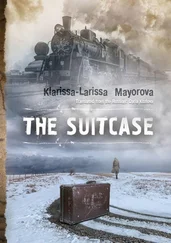He was losing morale. The wind flung crowds into their path, crying toddlers with bent shovels and tipped buckets, mothers in a tizzy, stately African women with what appeared to be pillowcases on their heads, sand-flinging adolescents, joggers, overdressed ethnic clans. They swarmed in and just as abruptly dispersed, leaving Pasha and Marina gasping for breath. While they were engulfed in one such burst, a hand materialized, a long, wiry hand that clawed the air twice before hooking Pasha’s bent shoulder. The hand’s owner and Pasha stepped aside to examine each other by the water. The man was the size of a tiny, desiccated tree that had withstood brutal winters. Clumps of coppery hair, a tight, aggravated mouth. Now the other hand stretched for the other shoulder. They embraced. Marina looked away, wary. Was this someone she also knew? Would his wife appear?
That’s Bronfman, Pasha whispered as they slipped away. Marina, relieved, only half listened. But Pasha was shaken up. According to Pasha’s mental records, Bronfman had been diagnosed with a rare form of leukemia during his last year at the Refrigeration Institute and died at the tragic age of twenty-one. But here was Bronfman, very much alive, working for the city’s transit bureau. Health insurance! Decent pay! Job Stability! Pasha, he said, you must work for the city. Except it’s impossible to find a job — at least it’s very, very difficult. The glitch must have been this: Unable to deal with a dearth of information, Pasha’s memory had filled in Bronfman succumbing to the disease, though in actuality his family had found a way to take him for treatment to the States, absconding urgently and covertly. In this miraculous land, he was cured, and here he remained.
That’s what he told you? Marina asked.
He said he was living in the yellowish bungalow on Corbin Place behind the poodle groomers and I should drop by Thursday evening for his meditation group. You can’t tell a man that you were sure he died fifteen years back.
Discovering Bronfman among the ranks of the living put Pasha in a frisky mood. He shook his beard into Marina’s face like a lavish, impulsively assembled bouquet, splashed her shins, and laughed in his deflating way, like the sound made by turning the exhaust valve on a blood-pressure monitor (a favorite evening pastime). They got back to find everyone deep into the stern phase of beach time. Esther sat under a giant hat that seemed to have been punched in on one side and chomped sunflower seeds, the gnawed shells lodging in the crevices around her crotch. While she was discarding, Robert was in the process of acquiring. There were no beautiful seashells on Brighton, but Robert was determined to collect regardless, as this was the endangered activity he was known for. Marina dropped to the blanket and resumed her solar torpor. Levik picked his toes, using his free hand to flip the pages of a year-old National Geographic . Pasha tried rousing them with over-the-shoulder taps and affectionate pinches, but they grew progressively grumpier until he gave up and waded into the warm, turbid ocean for the prescribed dunk.
While Marina was away, Frida had made a friend. The girls had dug a pit, fortified it, and adorned the fortress with turrets, parapets, some ornamental dripwork. They added a ditch at the base for water to collect and sat in the pit presiding over their domain. The friend was a fine-boned tyrant, making it apparent to Marina that what had been uncovered in her daughter was a tendency. Your side needs more shells, the friend said. Frida, who’d never notice such a deficit herself, ran over to Robert and asked for some of his. Overjoyed by the request, he distributed the shells one by one, holding them up to the light and rotating and telling a story about each. But the friend didn’t approve of this strategy. Those aren’t shells but scraps, she said. Frida scoured the shoreline until finally producing an adequate batch. The friend had a high forehead, a taciturn chin, collapsed blond ringlets crusted with sand. She pointed to where Frida must put each shell and once they were perfectly spaced granted Frida entry. With erect spines they sat in their puddle, laughing into the faces of those who made pleas to join them in housekeeping. After being turned away countless times, one persistent boy returned with a pancake. The friend admitted she was ready for a snack. Attempts to divide it into three pieces were unsuccessful — it was one slippery, tough pancake. They would have to go in a circle, taking bites off the edge.
Marina watched as the jellyfish was passed around. She couldn’t decide: to intervene or not to intervene? Instinct told her to go, but her body remained grounded. As Frida’s turn neared, Marina looked away, aware of an unreachable dread.
• • •
LET’S HEAD BACK, said Levik.
Why must you spoil everything? said Marina, herself in the first stages of heatstroke. You think I don’t see you checking your watch every second? No one’s keeping you here. Only next time we’re with your family, see how long I last.
Just then, the wind turned up. Esther’s hat flew high off her head like a puck in a strength-tester game. The ocean started to bubble, as if a colossal motor had been turned on in the depths. The bottom of the sky overtook the top, plugging any remaining holes, and the celestial concoction began to stew. A lost balloon was like a soccer ball being kicked around by an invisible aerial team. The ground tipped, and a sheet of sand slid eastward, burying blankets, towels, bags, and knocking vertical tanners, proselytizing proponents of upright sunning, off their feet. A protracted moment of stillness was had as the atmosphere held its breath, turning greenish blue from lack of oxygen. A lash in the distance was followed by an audible inhale of determination, a generative buzzing, an interspecies murmur. Airlifted off her throne, Frida’s friend thrashed wormlike until a bald, barrel-chested man set her down and landed his ringed hand on the weedy nape of her neck. A minute ago the collective focus was directed outward, to others, to the horizon; now it was sharply rerouted in. The rest of the world disappeared. People gathered, grabbed, collected. The sky, done stewing, began to crumble on raw, sunburned shoulders. Hunks of ice the size of pinecones. The more it came down, the darker the sky turned, like those who grow angrier as they rage.
When the cosmos broke open, Esther was expected to take a miraculous split second to bundle belongings and snap fingers to safety. She was equipped with a top-of-the-line primal-mother tool kit, with which she could produce a week’s worth of meals from iron shavings, lint, and maybe a wilted head of cabbage, use a threadbare curtain to dress her family (distant cousins included if need be), cure the common cold and any other malady non-emetic in nature (puking elicited no sympathy), and get her family out of a disaster without a scratch. But they were witness to a terrible malfunction. Esther kept sitting, squinting and blocking the hail with her hand as if the sun were too direct in her eyes. As she finally got to packing, time halted emphatically. She attempted to shake out her towel and seemed to consider the usual ritual of changing from her swimsuit before heading home. They stood frozen, stunned. A green chair was hurled through the air. Boardwalk waiters hadn’t managed to collect dinette sets in time, and they flew off, doily tablecloths along with tables. The furniture, sand, even ocean were fleeing. Only buildings stood heedlessly. Awnings suffered most, as they tried desperately but failed to disengage.
The beach almost fully evacuated, the remaining few were the elderly, moving as fast as creaky joints allowed. Lifeguards ran back and forth, tooting whistles. They soon abandoned the task of retrieving every last human scrap from the water and scurried to their stations. The scraps were insane, homeless, or drunk — what happened to them was already technically in the hands of fate. A pillar of dust came into view, tall and swirling, distorting everything in its path.
Читать дальше












